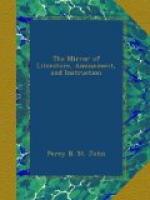It is very certain that the most natural tastes are the most simple: our first aliment is milk, and it is only by degrees we bring ourselves to relish strong food; one speaking proof that such stimulating diet is not natural to the human palate, is the indifference children have for such food, and they evidently prefer pastry, fruit, &c., until the digestive organs become more depraved. Neither has man the peculiarities of a carnivorous animal; he has no hawk-bill, no sharp talons to tear his prey, and he wants that strength of stomach and power of digestion which is requisite to assimilate such heavy fare; his tongue is not rough, but, as compared with that of ravenous animals, of a very smooth texture; neither are his teeth pointed and rough like a saw, which above all is a distinguishing mark. It is well known that in our West Indian colonies, all the negroes still surviving, who were originally brought over from Africa, have their teeth filed down to this day, which was at first expressly done for the purpose of tearing and eating human flesh. It is probable that the first man who adopted this most horrible custom, was driven to it by necessity and the want or scarcity of other food, and we know certainly that cannibals are as much excited by the spirit of revenge as by an appetite for flesh, in devouring their captured enemies; we, however, have not even this poor plea; we are even ungrateful in attending to the satisfaction of our desires, for we kill without remorse, as well the ox that labours for us, as the sheep that clothes us, and disregarding all the natural wealth of the fields, and the delicacies of the garden, we capriciously destroy creatures who are no doubt sent into the world to enjoy life as well as ourselves. But you who contend that you are born with an inclination to such food, why object to kill what you would eat? do it, however, with your own hands, and without the aid of a knife; tear your victim to pieces with your fingers, as lions do with their claws, and after worrying a hare or a lamb, fall on and eat alive as they do; drink up the flowing blood, and devour the flesh while it is yet warm! Is not the very idea horrible? we know we could not do it; as it is, the sight of uncooked flesh with all its raw horror excites loathing and disgust, and it is only by culinary preparation, it can be softened and rendered somewhat more susceptible of mastication and digestion; it must be completely transformed by roasting, boiling, &c., and afterwards so disguised by salts, spices, and various sauces, that the natural taste is gone, the palate is deceived into the admission of such uncouth fare, and finds a flavour in the taste of these cadaverous morsels.




